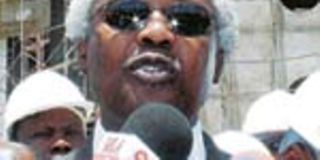KPC to Kenol: Pay up or stay out

Kenya Pipeline Company managing director George Okungu (centre, in glasses) speaks to journalists outside the firm's unfinished headquarters in Embakasi, Nairobi. The project was begun in 1998, but construction was held up due to a dispute with the contractor which was later resolved. It will house Kenya Pipeline staff based in the National Bank Building and save the firm Sh50 million in rent and related costs.

Kenya Pipeline Company managing director George Okungu (centre, in glasses) speaks to journalists outside the firm's unfinished headquarters in Embakasi, Nairobi. The project was begun in 1998, but construction was held up due to a dispute with the contractor which was later resolved. It will house Kenya Pipeline staff based in the National Bank Building and save the firm Sh50 million in rent and related costs.
Photo by Joan Pereruan
Kenya Pipeline Company has accused oil marketer, Kenol/Kobil, of refusing to pay it for services.
Kenya Pipeline managing director, George Okungu yesterday said while other petroleum companies are paying the company for storage and transportation services, Kenol/Kobil has refused to pay Sh50 million it owes. "I have met them [Kenol/Kobil] personally, we have tried to talk to them, but they have refused to pay," said Mr Okungu. He was addressing journalists outside KPC’s yet to be completed headquarters at Embakasi, Nairobi.
However, of the outstanding amount, the oil firms paid Sh100 million and $750,000 (Sh54 million) "just when the board insisted we were taking them off, three weeks ago."
Mr Okungu said the company then met Kenol/Kobil managing director Jacob Segman, and signed an agreement that the Sh50 million debt would be cleared. However, Kenol/Kobil refused to honour their portion of the agreement, he said. "As at now, they still owe us money. Everybody else has paid, including the struggling independent oil dealers." He said that the Transportation and Storage Agreement the Kenya Pipeline Company (KPC) signs with all oil companies, mandates it to deny Kenol/Kobil services.
Mr Okungu said: "The implications are such that if we were to lock Kenol/Kobil out for a longer time, off course consumers will suffer, but what do we do? Do we as a government body operate for free?" He said last week KPC gave Kenol/Kobil seven days notice to pay up or be locked out. The notice expires Saturday and Mr Okungu said if Kenol/Kobil does not pay its supply will be cut irrespective of the consequences. However, in a quick rejoinder, Kenol/Kobil denied owing any money to KPC.
In a statement signed by Kenol/Kobil communications officer Charles Njogu, the company said the Sh50 million outstanding is a matter before the courts and that there is a court injunction restraining the pipeline from interfering with Kenol/Kobil’s supply until the matter is heard. Any interference with our supply will be in contempt of court and we will file contempt proceedings appropriately, he said. Mr Njogu said the amount owing is Kenol/Kobil’s demurrage claim from KPC for shutting its vessels from offloading at Mombasa.
However, Mr Okungu said the company’s tanks in Mombasa have limited capacity and KPC has to know in advance that a company is importing. "If in the middle of the night you commandeer a ship and bring it into Mombasa, where do we create ullage for you?" he posed.
Mr Okungu said Kenol/Kobil had brought ships in an unscheduled manner and if KPC allowed them to dock it would deny other oil companies the use of the facility. Mr Okungu said while other firms are trying to trade legitimately under a well-organised oil industry importation scheme, Kenol/Kobil does not want these other companies to compete. "I view this as an extension of a war between oil marketing companies being extended to disrupt and sabotage the operations of KPC," he said.




